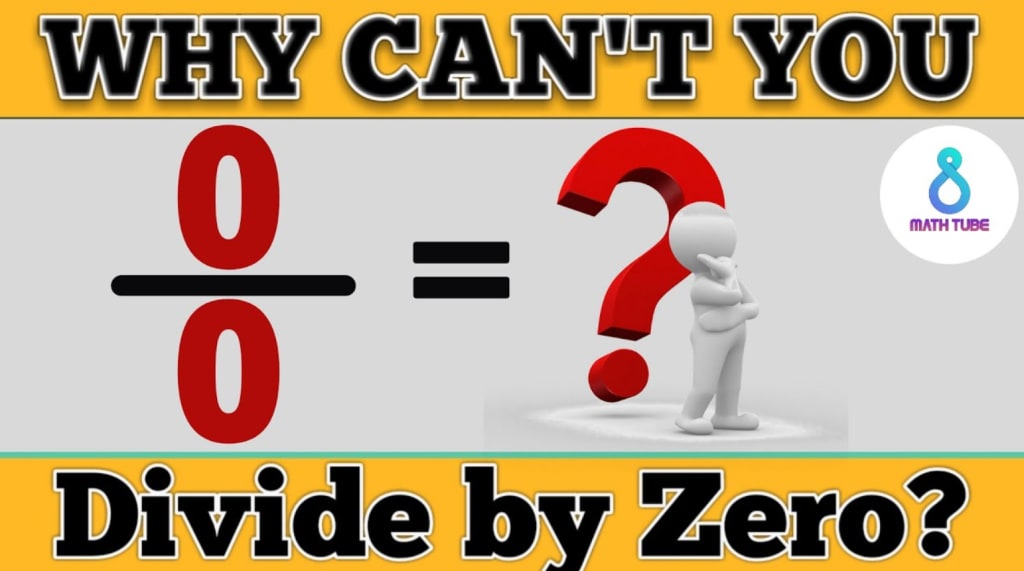Why can't you divide by zero?
Understanding the Division by Zero Conundrum

In the world of mathematics, few rules are as universally accepted and rigorously enforced as the prohibition against dividing by zero. This simple operation, which combines a basic arithmetic operation with a seemingly innocuous number, has profound implications that extend far beyond elementary mathematics into complex theoretical realms. Why exactly is dividing by zero such a forbidden territory in mathematics, and what happens when we attempt to break this rule?
To understand the intricacies of division by zero, let's first revisit the fundamental concept of division itself. Division is the mathematical operation that seeks to determine how many times one number (the divisor) is contained within another number (the dividend). For example, when we divide 10 by 2, we are essentially asking how many 2s fit into 10, which yields the result 5.
Now, let's consider what happens when we attempt to divide by zero. Take the expression 10 divided by 0. On the surface, one might speculate that the result should be infinity, since dividing a number by progressively smaller numbers tends to yield larger results. However, this intuition quickly runs into problems when we examine it more closely.
Mathematically, division by zero is undefined. This means there is no meaningful numerical value that can be assigned to the expression 10 / 0 within the framework of conventional arithmetic. To understand why, we need to delve into the properties of multiplication and inverse operations.
Every nonzero number has a multiplicative inverse, which is a number that, when multiplied by the original number, yields the identity element (usually 1). For instance, the multiplicative inverse of 2 is 1/2 because 2 * (1/2) = 1. However, zero does not have a multiplicative inverse. This is because any number multiplied by zero equals zero, not one. Therefore, there is no number that can be multiplied by zero to yield 1, which means zero lacks a well-defined inverse.
In mathematical terms, if we denote the multiplicative inverse of a number x as 1/x, then for any nonzero x, 1/x * x = 1. However, for zero, there is no such number that satisfies this condition. Consequently, division by zero results in a mathematical contradiction because it implies seeking a solution to an equation like 0 * y = 1, which has no valid solution in the realm of real numbers.
To illustrate further, consider the implications of allowing division by zero. If we were to define division by zero as yielding infinity (i.e., 10 / 0 = ∞), we would encounter inconsistencies when applying basic arithmetic operations. For example, the expression 0 * ∞ = 1 would conflict with established mathematical principles, leading to contradictions and paradoxes within the numerical system.
Moreover, the consequences of defining division by zero as infinity extend beyond elementary arithmetic into advanced mathematical fields such as calculus, number theory, and physics. In calculus, for instance, division by zero leads to indeterminate forms that require more sophisticated techniques, such as limits and derivatives, to resolve. These techniques involve approaching the division by zero scenario indirectly, rather than attempting to define it directly.
In physics, where mathematical models describe natural phenomena, division by zero can imply undefined physical quantities or breakdowns in theoretical frameworks. For instance, in equations describing the behavior of particles or waves, division by zero can lead to nonsensical predictions or invalid mathematical operations, highlighting the critical importance of maintaining mathematical rigor.
Interestingly, mathematicians and theorists have explored alternative mathematical structures where division by zero is defined or handled differently. For example, in some advanced algebraic structures or abstract mathematical spaces, division by zero may be interpreted within specific rules or frameworks that differ from traditional arithmetic. These explorations often involve creating new mathematical systems or extending existing ones to accommodate scenarios where division by zero is meaningful or permissible.
In conclusion, while the prohibition against dividing by zero may seem like a simple rule, its implications are profound and far-reaching within the realm of mathematics and its applications. By respecting this rule, mathematicians uphold the integrity and consistency of mathematical reasoning, ensuring that arithmetic operations yield meaningful results and that mathematical models accurately describe the world around us. Thus, division by zero stands as a testament to the foundational principles of mathematics, emphasizing precision, clarity, and logical coherence in mathematical discourse and exploration.
About the Creator
ava
The future belongs to those who prepare for it today
Enjoyed the story? Support the Creator.
Subscribe for free to receive all their stories in your feed. You could also pledge your support or give them a one-off tip, letting them know you appreciate their work.






Comments
There are no comments for this story
Be the first to respond and start the conversation.